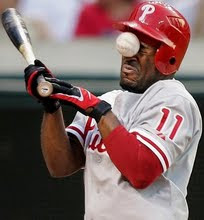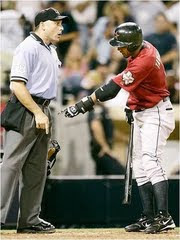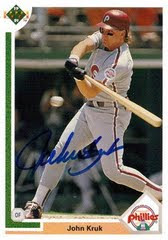With the NFL draft a little over a week away, NFL Live's Tim Hasselbeck says he would never draft a RB in the first round. This reminded me of a conversation The Bright One and I had a while back during the 2008 football season- one in which a good friend of his shared the same exact sentiment. Obviously if you can find a player like Walter Peyton or even Adrian Peterson, you snatch him up as quickly as possible. But if you're a RB behind an AP-like player in the draft, there's not a whole lot of difference between the #2 RB and say the #10 RB. Mainly because RB rely so heavily on their offense line. So I wanted to look at two questions in this post: 1) Should a team ever draft a RB before the 2nd round? and 2) How much of a RBs stats are based off the offensive line and how much is based of a RB's talent?
I'd like to start with the second question first: is stats due to the offensive line or the RB? Last year, according to footballoutsiders.com, the top five rushing O-lines were: Denver, New England, New York Giants, New York Jets, and Washington Redskins. And according to RB stats, the top five RBs were: DeAngelo Williams, Brandon Jacobs, Clinton Portis, Derrick Ward, and Thomas Jones. There's actually not a whole lot of discrepancy here. Both Ward and Jacobs are Giants RB. It's no surprise that the Giants who have 3rd best rushing line was able to produce two players in the top five. Thomas Jones made his first pro bowl last year but he also had the 4th best rushing line in front of him. Portis was the #2 overall back in front of the 5th best rushing line. And as for the best RB last year and who I called the MVP DeAngelo Williams, his rushing O-line was 7th.
Well, you might ask, "how come there is no Patriot or Broncos RB on that list?" Well that's easy, both teams used 4 or more RBs so obviously running stats for one individual player is going to be low. Denver went through at least 8 RBs last year, mainly due to injury, and the Pats just rotated in guys like Sammy Morris (5th in DVOA), Kevin Faulk, LaMont Jordan, and Ben Jarvis Green-Ellis (the latter three had less than 100 carries each so they do not qualify for stats like the other top RBs mentioned do. However, for guys who had less than 100 carries: Faulk is #1, Jordan is #5, and Ellis is #17. And for Denver, because they also didn't really have guys who had significant carries: Peyton Hillis was #3, Michael Pittman was #7 and Tatum Bell was #11)
But let's see if this type of thing also hold true year after year. In 2007 the top RBs were (and their subsequent teams rushing O-line ranking): Brian Westbrook (PHI 4th), LT (SD 24th), Marion Barber (DAL 14th), AP (MIN 15th), Jospeh Addai (IND 5th). In 2006: LT (SD 1st), Brian Westbrook (PHI 3rd), Tiki Barber (NYG 4th), Joseph Addai (IND 5th), Larry Johnson (KC, 17th). In 2005: Larry Johnson (KC 3rd), Sean Alexander (SEA 7th), Edge (IND 1st), Tiki Barber (NYG 10th), Rudi Johnson (CIN 4th). In 2004: Curtis Martin (NYJ 2nd), Corey Dillon (NE 5th), Edge (IND 1st), Priest Holmes (KC 3rd), Sean Alexander (SEA 9th).
As you can see, if a RB is top five the league, it tends to be that his rushing offense line tends to also be top five, if not top 10. Especially if the RB is on teams like the Colts or the Jets, the RB seem to do well because of the offensive line. The one outlier seems to be in 2007. LT, Barber, and AP has exceptional years yet their rushing lines were 14th or lower. But I think these are clearly examples of sometimes a RB is good no matter the O-line. LT is one of the games great players (although his career setting year in '06 is obviously more the O-line than him, but still, I mean the guys just amazing); as mentioned at the top of the article, Peterson could end his career, assuming health, as being on Walter Peyton's level; and Marion Barber's running style will help him get yards no matter the O-line (however this does cause him to be more of an injury risk). But overall, RBs that have great years is mainly due to the line and not necessarily due to the RB's talent.
But this is not a perfect correlation either. Just because a RB is the best does not necessarily mean his rushing offensive line is the best and just because a player plays for the best rushing offensive line, does not mean he will be the best RB. This means that a RBs talent does play a factor into his own stats, but in reality that factor is a lot smaller than the vast majority of people think.
So now onto the second question, should a team ever draft a RB in the 2nd round or lower? Well I think to help answer this question, we can look at fantasy football. I'm going to list the top RBs according to ESPN's fantasy football (yes I realize it's fantasy but if a RB is good in fantasy play, then they actually will be very good in reality play. Fantasy football has a better correlation than baseball does) and then see what round that player was drafted in:
1) Adrian Peterson- 1st
2) Matt Forte- 2nd
3) Michael Turner- 5th
4) Maurice Jones-Drew- 2nd
5) DeAngelo Williams- 1st
6) Chris Johnson- 2nd
7) Steven Jackson- 1st
8) Brian Westbrook- 3rd
9) Frank Gore- 3rd
10) Marion Barber- 4th
11) Steve Slaton- 2nd
12) Clinton Portis- 2nd
13) LaDainain (LT) Tomlinson- 1st
14) Brandon Jacobs- 4th
15) Joseph Addai- 1st
16) Kevin Smith- 3rd
17) Ronnie Brown- 1st
18) Marshawn Lynch- 1st
19) Derrick Ward- 7th
20) Thomas Jones- 7th
Out of the top 20, 7 were drafted in the first round, 5 in the second, 3 in the third, and 5 in rounds 4-7. This may seem like it actually is worth it to take a RB in the first round but 65% of the top 20 were NOT first round picks. AP and LT are players like the ones I mentioned earlier, backs that will be amazing no matter the O-line. The one first rounder that sticks out to me is Joseph Addai. The Colts have had one of the best rushing offensive lines throughout the past five+ years, that they probably could have taken a RB in the later rounds and still have had the production that Addai has had. Forte, K. Smith, Slaton, Jones-Drew and C. Johnson are the younger ones on this list, some of the best on this list, and all were taken in the 2nd or 3rd round. But the one thing on this list that sticks out to me, is that there is not a clump or group of the same round draftees in one place. The #3 RB is a fifth rounder and the #18 RB is a first rounder.
So, now let's go back to the original question: should a team ever draft a RB is the first round? Well, sometimes, but mainly no. It's not necessarily a waste to do so but you can always get value in a later round. But I think something else to consider is health. Yes, you clearly need a good Line, but if you have a player that has shown to get constantly injured or deals with injuries badly (like many "experts" are telling me about Ohio State RB Chris "Beanie" Wells), its probably not the best idea to draft that player in a higher round (you hear that New Orleans?). So if you think there's a handful of backs that are just as good as some projected first rounders, but are injury risks, then it's probably a good thing to take a RB is the first round. And sometimes when you're not good/ too stupid to realize your teams O-line sucks or is just mediocre (Buffalo Bills), it may be a good idea to take a RB in the first round (Marshawn Lynch). But because the line sucks the RB may not achieve top-tier like he could, but he's still worth a first round pick.
But overall, the line still is more important than the RB itself. So if I were a GM, I would concentrate more on the line than the RB. That way, in a future draft, I can draft a RB in the 2nd or 3rd round, not waste a first round pick, and still have a lot of production out of the RB position.
Where Would You Draft A RB?
Posted by
Adam Kaplan
on Wednesday, April 15, 2009
Labels:
Draft,
Running Backs







2 comments:
the problem is supply and demand. All teams cant wait till the 2nd/3rd round to draft a RB, hence some teams need to reach to the 1st to get a RB they want. Unless the owners agree to collude against RBs and agree to never draft a RB above the 2nd.
I like to think that edgerrin james was a great RB, he was much better than rickey williams their rookie years, but the way he sucked after leaving Indy makes me think he was a product of the offensive line.
Also, the benefit of drafting o-line is that they have a surprisingly long shelf life, like over 10 years, but RBs are usually done by the 7th year max.
It just seems like its the essential thing to do- build a team around the offense and defense lines, everything else will come later.
The Vikings and the Giants are the two teams right now that are really doing this. Even with shitty ass Tavaris Jackson, the Vikiings can make it to the playoffs again. And even with Jay Cutler, the Bears probably won't make it.
I still think that no matter what, if you build your team the right way, you can let other owners and GM fight for players that might not be so good in the long run so you can sit back and deal with the "leftovers" which will be very advantageous to you
Unfortunately we do not live in the real world and realistically teams will never really do this, but still, they should
Post a Comment